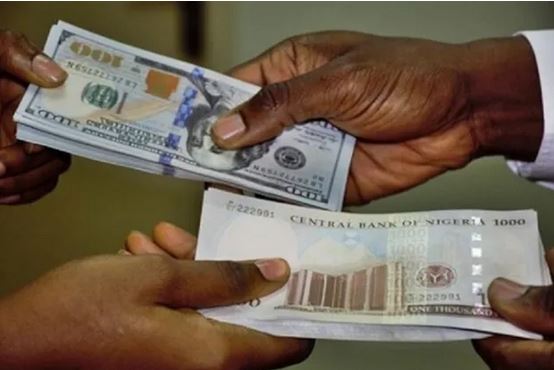Dollar to naira exchange rate has remained stable at official market as forex supply rises by over 100%.
Newsonline reports that dollar to naira exchange rate closed at N415.07/$1 at the official Investors and Exporters (I&E) window.
This online newspaper understands that Naira remained stable against the US dollar on Thursday to close at N415.07/$1. This was the same rate that was recorded in the previous trading sessions as a drop in the country’s external reserves continues with a decline of $20 million.
However, the naira depreciated against the US dollar on Thursday as it closed at N570/$1. This represents a N2 drop when compared to the N568/$1 that was recorded in the previous trading session. This is according to information obtained from BDC operators.
The local currency remained stable at the official market as the forex turnover rose significantly by 100.6% during Thursday’s trading session.
Trading at the official NAFEX window
The exchange rate at the Investors and Exporters window remained stable to close at N415.07/$1 on Wednesday, the same rate that was recorded at the last trading session.
The opening indicative rate also remained stable to close at N413.71/$1 on Thursday, which was the same rate that was recorded in the previous trading session.
An exchange rate of N444/$1 was the highest rate recorded during intra-day trading before it settled at N415.07/$1, while it sold for as low as N404/$1 during intra-day trading.
Forex turnover at the official window rose by 100.62% to trade at $453.38 million on Thursday.
According to data tracked by Nairametrics from FMDQ, forex turnover at the I&E window increased from $225.99 million on Wednesday 8th December 2021, to $453.38 million on Thursday 9th December 2021.
Cryptocurrency watch
The world’s largest and most popular cryptocurrency, Bitcoin, declined by 2.92% to trade at $48,316.64 with losses accelerating after it failed to sustain the positive momentum seen following last weekend’s flash crash.
Most cryptocurrencies traded lower on Thursday after Fitch Ratings labelled China’s Evergrande Group as an official defaulter. Equities also drifted lower as traders appeared to be concerned about the risk of a global slump resulting from China’s credit woes.
Cryptocurrencies have posted wild moves over the last few sessions, most notably over the past weekend, when many were swept up in a broader risk-off wave that also hit U.S. equities. It happened as spiking inflation is forcing central banks to tighten monetary policy, threatening to reduce the liquidity tailwind that lifted a wide range of assets.
Meanwhile, Ethereum, the world’s second largest cryptocurrency by market capitalization dropped by 5.66% to trade at $4,119.87
Crude oil price
Oil price rally ended on Thursday with Brent crude dropping by 0.31% to trade at $74.19 per barrel ahead of higher risk events that are expected to headline on Friday.
A red-hot start to the week fizzled, with the market reassessing the potential demand hit from the omicron variant.
Brent crude had rallied above $75 earlier on Thursday in a confidence boost for OPEC+ that they had done the right thing by planning to boost production by another 400,000 bpd in January.
There is some fear lingering in the market with regards to additional Covid-19 measures that could dampen oil demand. But the appetite for crude oil on Thursday was also diminished by high-risk releases expected on Friday, with traders eyeing in particular, U.S. inflation figures.
However, crude is still set for the biggest weekly gain since August after jumping more than 9% during the first three days of the week. It’s a remarkable turnaround after oil tumbled into a bear market following a multi-week plunge.
The West Texas Intermediate dropped by 0.25% to trade at $70.76 per barrel. Natural gas was up by 0.16% to trade at $3,820 while OPEC Basket went up by 5.15% to trade at $75.09 per barrel.
On the other hand, Nigerian crude, Bonny Light dropped by 0.47% to trade at $74.83 per barrel.
External reserves
Nigeria’s external reserve dropped by 0.05% on Wednesday, 8th December 2021, to close at $40.931 billion. This represents a decrease of $20 million compared to $40.951 billion recorded as of the previous day.
The consistent decline that had been experienced in the country’s reserve level could be attributed to the continuous intervention of the apex bank in ensuring the stability of the exchange rate.
It is worth noting that the nation’s foreign reserve had gained $5.99 billion in the month of October, as a result of the $4 billion raised by the federal government from the issuance of Eurobond in the international debt market.
In the month of November, Nigeria’s external reserve lost $633.47 million in value as against a gain of $5.99 million recorded in the previous month and $2.76 million gain in September 2021. On a year-to-date basis, the reserve gain has reduced to $5.74 billion.














